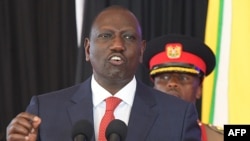"This country of ours will not default. I want to give you my assurance. Our country will not default on our obligations. We have applied (the) brakes on any more borrowing," Ruto said in a wide-ranging interview with Kenyan media outlets.
He added that the government aimed to collect an extra 1 trillion shillings ($8.11 billion) in taxes in the next 24 months, and reiterated plans to cut 300 billion shillings in borrowing in the current fiscal year that runs until the end of June.
The East African nation's public debt surged during an infrastructure construction drive under Ruto's predecessor Uhuru Kenyatta, prompting warnings from ratings agencies.
Ruto's government, which took over in September, has pledged to curb expensive commercial borrowing in favor of cheaper sources like the World Bank to reduce debt servicing pressures.
Like other developing economies, Kenya found it almost impossible to raise funds from international bond markets in 2022 due to a surge in yields.
In June it was forced to cancel the planned issuance of a Eurobond and is seeking alternative sources of funding.
In February 2022, ratings agency Fitch said rising government debt levels and global interest rates were increasing the risk of credit rating downgrades in as many as 10 African countries, with Kenya, Ghana, Lesotho, Namibia, Rwanda and Uganda most at threat.





